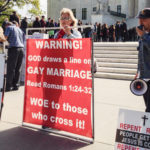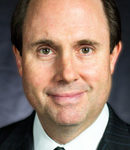WACO—Texas Baptists established affirmation of same-sex marriage as grounds for declaring a church outside the bounds of cooperation with the Baptist General Convention of Texas.
 Craig Christina, pastor of Shiloh Terrace Baptist Church in DallasMessengers to the BGCT annual meeting in Waco approved a motion from Craig Christina, pastor of Shiloh Terrace Baptist Church in Dallas, declaring, “because of the historical and biblical positions of the BGCT as stated in multiple resolutions, motions and actions, that any church which affirms any sexual relationship outside the bonds of a marriage between one man and one woman be considered out of harmonious cooperation with the Baptist General Convention of Texas.”
Craig Christina, pastor of Shiloh Terrace Baptist Church in DallasMessengers to the BGCT annual meeting in Waco approved a motion from Craig Christina, pastor of Shiloh Terrace Baptist Church in Dallas, declaring, “because of the historical and biblical positions of the BGCT as stated in multiple resolutions, motions and actions, that any church which affirms any sexual relationship outside the bonds of a marriage between one man and one woman be considered out of harmonious cooperation with the Baptist General Convention of Texas.”
Before messengers voted on that motion, they first approved a motion by Steve Wells, pastor of South Main Baptist Church in Houston, which said, “the convention reserves to itself exclusively, through a two-thirds vote of its Executive Board, the authority to remove a congregation from harmonious cooperation.”
Steve Vernon, BGCT associate executive director, explained the committee on convention business interpreted Wells’ motion as establishing a process for declaring a church out of cooperation with the BGCT, while Christina’s motion sets a standard for determining the parameters of harmonious cooperation.
However, Wells’ motion also defined “harmonious cooperation” as “comprised of three actions on the part of the churches—prayer, financial support of the convention and engagement in the ministry of the convention.”
Two churches placed on notice
A few day before the annual meeting, BGCT officials placed two churches on notice that an affirming stance toward LGBT members puts them outside the bounds of cooperation with the state convention.
BGCT Executive Director David Hardage, BGCT President René Maciel and Executive Board Chairman David Russell sent letters Nov. 8 to First Baptist Church in Austin and Wilshire Baptist Church in Dallas. The letter to Wilshire framed the congregation’s relationship to the BGCT in terms of “potential withdrawal,” since a vote by the congregation on full privileges for LGBT members was pending at that point.
Prior to the BGCT annual meeting, members of Wilshire had been in the process of voting on a resolution to affirm the church’s existing bylaws, which provide for a “single class of membership.” The final vote was held the day before the BGCT annual meeting started. Wilshire approved the resolution by a 61 percent favorable vote, Pastor George Mason announced Monday afternoon, Nov. 14.
Sign up for our weekly edition and get all our headlines in your inbox on Thursdays
Give deliberative authority to the board
 Steve Wells, pastor of South Main Baptist Church in HoustonSpeaking on behalf of his motion, Wells characterized it as a “friendly motion” that would help the BGCT make its way through “divisive days in Baptist life” by giving the deliberative authority to the Executive Board and requiring a high threshold of approval.
Steve Wells, pastor of South Main Baptist Church in HoustonSpeaking on behalf of his motion, Wells characterized it as a “friendly motion” that would help the BGCT make its way through “divisive days in Baptist life” by giving the deliberative authority to the Executive Board and requiring a high threshold of approval.
Wells framed it as the most preferable of three options. To rely on the BGCT Executive Board’s administrative staff to decide if a church is in cooperation places too much pressure on them and gives them too much authority, he insisted. To decide by a vote on the floor of the annual meeting fosters division and draws media scrutiny, he asserted.
Noting the messengers to the annual meeting unanimously had elected a slate of nominees for the Executive Board, he urged Texas Baptists to “trust the folks we have elected” to handle difficult matters with discernment.
Executive Board Chair Russell joined other messengers in speaking in favor of Wells’ motion. Russell explained he agreed to sign the letter mailed to the Austin and Dallas churches because it was “in keeping with the traditional stands taken” by the convention, but he believed it placed the executive director in an “unfair position” of making the determination whether a church is in cooperation with the BGCT.
Bruce Webb, pastor of First Baptist Church in The Woodlands, questioned whether the motion conflicted with the convention’s bylaws. Vernon replied the bylaws to which Webb referred deal with seating messengers to the annual meeting, but they do not directly address the matter of a congregation’s relationship to the convention between annual meetings.
After lengthy discussion, Wells’ motion passed.
‘Chosen to step outside the circle’
Christina then spoke in favor of his motion, noting it establishes as policy the convictions regarding homosexual behavior Texas Baptists previously expressed in multiple resolutions and through other actions.
“I want to be clear to say we are not drawing the circle (of membership) smaller. The circle remains the same,” he said. “Some churches have chosen to step outside the circle.”
Jackie Baugh Moore spoke against the motion, characterizing it as “impossible to monitor and manage.” She questioned what would be the threshold for determining when a church is seen as affirming and who would make the determination. So, she made a motion to table—or ultimately refer—the matter to the Executive Board for further study.
After discussion and three close show-of-ballot votes, the motion to refer failed.
A defining characteristic?
Returning to discussion of the original motion, Wells spoke against it. He asked whether churches that agreed with traditional Baptist views about key doctrines should be considered outside the circle of cooperation because they hold minority views about homosexuality.
“Does it rise to the level of a defining characteristic of who we are?” he asked.
Ryan Buck, pastor of First Baptist Church in Mason, noted if the BGCT failed to act after becoming aware of affiliated churches that affirm homosexual behavior, it could create a backlash from conservative congregations.
If the BGCT did not take a stand and remove the affirming congregations, he said, “we will have churches that leave the convention voluntarily.”
Taylor Sandlin, pastor of Southland Baptist Church in San Angelo and chair of the Baptist Standard Publishing board of directors, questioned the impact the convention’s action would have on churches as they try to be a witness in a secular society.
“It may make us feel good to take a stand, but it does not help us take a step toward our neighbors,” he said.
Cheryl Kimble, pastor of Highland Park Baptist Church in Austin, asserted the motion violated two key distinctive Baptist principles—the right of the individual believer to interpret and follow Scripture and the autonomy of the local congregation.
On the other hand, Bill Skaar, pastor of First Baptist Church in Grand Prairie, insisted “every Baptist entity is autonomous,” including the state convention.














We seek to connect God’s story and God’s people around the world. To learn more about God’s story, click here.
Send comments and feedback to Eric Black, our editor. For comments to be published, please specify “letter to the editor.” Maximum length for publication is 300 words.